| dc.contributor.advisor | Acevedo Rodríguez, Magda Yaneth | |
| dc.contributor.author | Lizcano Florez, Leidy Marley | |
| dc.coverage.temporal | 2013 | |
| dc.date.accessioned | 2020-09-10T14:42:10Z | |
| dc.date.available | 2020-09-10T14:42:10Z | |
| dc.date.issued | 2013 | |
| dc.identifier.uri | http://hdl.handle.net/20.500.11912/5984 | |
| dc.description | 25 páginas | spa |
| dc.description.abstract | A continuación se presenta un estudio de caso recibido en el Centro de Proyección Social de Piedecuesta - Santander bajo la modalidad de práctica para obtención del título de Especialista en Psicología Clínica, este caso se abordó a partir de la perspectiva de la terapia sistémica en la que las diferentes problemáticas sustentadas en la narrativa de vida de una paciente le han dado pasoa conflictos dentro del sistema y se vinculan con el entorno social al cual pertenece. Se recurrió a la terapia narrativa como estrategia significativa para comprender la forma en que la familia se relaciona y se organiza en torno al síntoma manifiesto. Se pretende exteriorizar el problema, reconocerlo, redefinir la relación de los miembros de la familia y llevar al sistema a la movilización de sus propios recursos para establecer nuevos relatos e ideas que perduren y den paso a nuevas narrativas que favorezcan el desarrollo del sistema. La técnica específica con la cual se desarrollóel proceso terapéutico se centró en la externalización del problema, las sesiones se desarrollaron de manera individual, familiar y de pareja. | spa |
| dc.description.abstract | Below is a case study in the Center received Social Projection Piedecuesta - Santander in the form of practice to obtain the title of Specialist in Clinical Psychology, this case is addressed from the perspective of systemic therapy in which the different problems grounded in the narrative of a patient's life have given way to conflicts within the system and somehow any difficulties with the social environment to which it belongs. He turned to narrative therapy as significant tool for understanding how the family relates and is organized around symptoms manifest. The aim is to externalize the problem, acknowledge it, redefine the relationship between family members and bring the system to mobilize its own resources to establish new stories and ideas that will last and give way to new narratives that support the development of the system. The specific technique which developed the therapeutic process outsourcing focused on the problem, the sessions were developed individually, family and partner. | eng |
| dc.format.mimetype | application/pdf | |
| dc.language.iso | spa | |
| dc.publisher | Universidad Pontificia Bolivariana | spa |
| dc.rights | Attribution-NonCommercial-NoDerivatives 4.0 International | * |
| dc.rights.uri | http://creativecommons.org/licenses/by-nc-nd/4.0/ | * |
| dc.subject | Terapéutica | spa |
| dc.subject | Familia | spa |
| dc.subject | Depresión mental | spa |
| dc.title | Terapia narrativa en un caso de depresión mayor | spa |
| dc.type | Especialización | spa |
| dc.publisher.department | Escuela de Ciencias Sociales | spa |
| dc.publisher.program | Especialización en Psicología Clínica | spa |
| dc.type.hasVersion | publishedVersion | spa |
| dc.description.sectional | Bucaramanga | spa |
| dc.description.degreename | Especialista en Psicología Clínica | spa |


